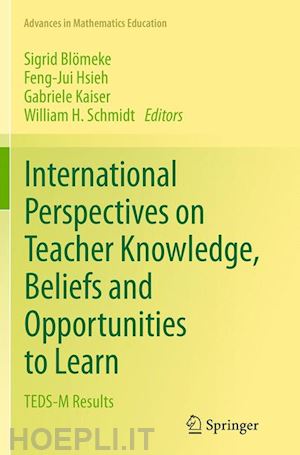1. Introduction: State of research, framework and design of TEDS-M: S. Blömeke, F.-J. Hsieh, G. Kaiser & W. H. Schmidt.- 2. Teacher knowledge at the end of teacher education: International perspectives.- 2.1 Teacher education effectiveness: Quality and equity of future primary teachers’ mathematics content and mathematics pedagogical content knowledge: S. Blömeke, U. Suhl & G. Kaiser.- 2.2 Teacher education effectiveness: Quality and equity of future lower secondary teachers’ mathematics content and mathematics pedagogical content knowledge: W. H. Schmidt et al.- 2.3 Teacher education effectiveness: Quality and equity of future primary and future lower secondary teachers’ general pedagogical knowledge: J. König, S. Blömeke, L. Paine, W. H. Schmidt & F.-J. Hsieh.- 2.4 In-depth analyses of different countries' responses to MCK and MPCK items: Why did Taiwan excel? A view on the difference within and between East and West: F.-J. Hsieh et al.- 3. Teacher beliefs at the end of teacher education: International perspectives.- 3.1 The cultural notion of teacher education: Future primary teachers' beliefs on the nature of mathematics: A. Felbrich, G. Kaiser & Ch. Schmotz.- 3.2 The cultural notion of teacher education: Future lower secondary teachers' beliefs on the nature of mathematics, the learning of mathematics and mathematics achievement: S.-J. Tang & F.-J. Hsieh.- 3.3 The cultural notion of teacher education: Comparison of lower secondary future teachers’ and teacher educators’ beliefs: T.-Y. Wang, F.-J. Hsieh, T.-T. Yiu.- 4. Relationship of teacher knowledge and beliefs: International perspectives.- 4.1 On the relationship of future primary and lower secondary teachers’ knowledge and beliefs: W. H. Schmidt et al.- 4.2 Profiles of lower secondary teachers’ knowledge and beliefs: A latent class analysis: S. Blömeke & U. Suhl.- 4.3 On the relationship of tested knowledge and self-reported perception of preparedness forteaching: A fuzzy field: S. Blömeke.- 5. Opportunities to learn in teacher education: International perspectives.- 5.1 Homogeneity or heterogeneity? Profiles of opportunities to learn in primary teacher education: S. Blömeke & G. Kaiser.- 5.2 Homogeneity or heterogeneity? Profiles of opportunities to learn in lower secondary teacher education: W. H. Schmidt et al.- 6 Effects of OTL on teacher knowledge and beliefs: International perspectives.- 6.1 What matters in primary teacher education? A comparison of background, selectivity and OTL effects on future teachers’ mathematics content and pedagogical content knowledge: S. Blömeke, U. Suhl, G. Kaiser & Döhrmann.- 6.2 What matters in lower secondary teacher education? A comparison of background, selectivity and OTL effects on future teachers’ content knowledge: W. H. Schmidt et al.- 6.3 Does school experience matter for future teachers' general pedagogical knowledge? J. König & S. Blömeke.- 7. Country studies.- 7.1 MCK and MPCK of primary and lower secondary teachers at the end of teacher education in Taiwan: Hot topics and pressing issues.- 7.2 MCK and MPCK of primary and lower secondary teachers at the end of teacher education in the USA: Hot topics and pressing issues: W. H. Schmidt et al.- 7.3 MCK and MPCK of primary and lower secondary teachers at the end of teacher educa-tion in Germany: Hot topics and pressing issues: G. Kaiser et al.- 7.4 MCK and MPCK of primary and lower secondary teachers at the end of teacher educa-tion in Singapore: Hot topics and pressing issues: K. Wong et al.- 8. Methodological reflections on the TEDS-M instruments and the nature of teacher knowledge.- 8.1 The conceptualization of MCK and MPCK in TEDS-M: Döhrmann, M., Kaiser, G. & Blömeke, S.- 8.2 Diagnosing teacher knowledge by applying multidimensional item response theory and multi-group models: S. Blömeke, R. Houang & U. Suhl.- 8.3 The conceptualization of indicators for mathematics teachereducation: Hsieh, F.-J., Law, C.-K., Shy, H.-Y., Wang, T.-Y., Hsieh, C.-J., Tang, S.-J.- 9. Conclusions: What we have learned and future challenges.











